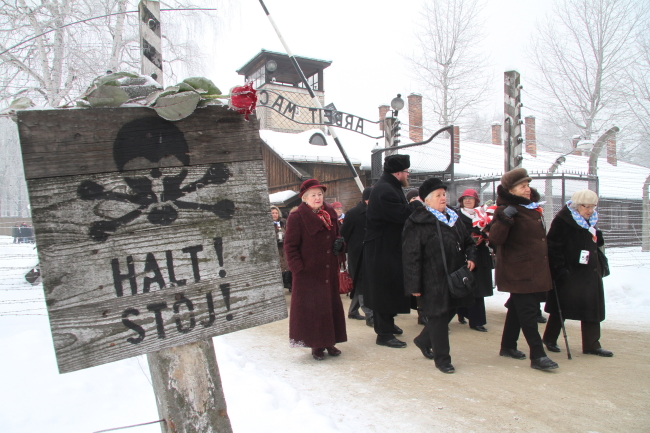
Former prisoners take part in anniversary ceremonies: photo - PAP/Jacek Bednarczyk
The invited guests, including Russian Parliament's chairman Sergey Naryshkin, Polish Culture Minister Bogdan Zdrojewski, former prisoners, clergy and politicians from various countries, are marking the day the camp, located in southern Poland, was liberated by Soviet troops, after around 1.1 million died there at the hands of the occupying German Nazis, most of them Jews, but also Poles, Roma Gypsies, political prisoners and others.
In 2005, the UN General Assembly declared 27 January, the anniversary of the liberation of the Auschwitz-Birkenau death camp, as International Holocaust Remembrance Day.
Ceremonies began in the morning on Sunday with a Holy Mass for the victims and survivors of the Holocaust, celebrated at the Church of Divine Mercy, located near the former Auschwitz I camp., with the main ceremony commemorating Holocaust victims taking place at the Monument to the Victims in Birkenau in the afternoon.
The visual symbol of this year's celebration is a picture by a former prisoner, Halina Ołomucka, a Polish Jew, entitled "Liberation."
“This image highlights, on the one hand, the joy of the end of the camp ordeal, and yet the unimaginable toll of the camp experiences that the liberated will have to carry with them until the end of their days,” says director of the Auschwitz Museum, Piotr Cywiński.
As part of this year's commemorations, a new Russian exhibition is opening in block 14, prepared by the Central Museum of the Great Patriotic War in Moscow.
“People survived and gave testimony. Today, thanks to their words and also to the original extant remains of the camp space, we remember and we try to understand. The knowledge we have obtained imposes a fearful obligation on us,” Piotr Cywiński writes in the 2012 Auschwitz Memorial and Museum summary report, which was published on Friday.
On Germany's responsibility for the Holocaust, Chancellor Angela Merkel has said in a podcast on her official web site: "Naturally, we have an everlasting responsibility for the crimes of national-socialism, for the victims of World War II, and above all, for the Holocaust.”
“We must clearly say, to generation after generation, and say it again: with courage, each individual can help ensure that racism and anti-Semitism have no chance," Merkel added. (pg)